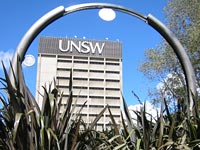Applied Linguistics - 8236
Program Summary
Faculty: Faculty of Arts and Social Sciences
Contact: hal@unsw.edu.au
Campus: Sydney
Career: Postgraduate
Typical UOC Per Semester: 24
Min UOC Per Semester: 6
Max UOC Per Semester: 24
Min UOC For Award: 96
Award(s):
Master of Applied Linguistics
View program information for previous years
Program Description
The Master of Applied Linguistics (MAppLing) is made up of postgraduate courses that extend and deepen students' existing skills, knowledge and understanding in professionally relevant fields of study, as well as teaching advanced skills in research and analytical thinking. It is equally suitable for people wishing to switch to an academic or professional field different from the one they studied at undergraduate level. The MAppLing can serve as a pathway to higher degree research for students who have not completed a four year BA(Honours) with a research component in the relevant area of study.
Linguistics is the study of human language. Its practitioners address questions such as: How do people use language in various situations? What is the biological basis for language? Is language unique to the human species? How and why do languages change? How do children learn language? What is the meaning of 'meaning'? Can machines talk? Linguistics also provides a basis for a variety of practical applications, including the teaching and learning of foreign languages, translating and interpreting, facilitating cross-cultural communication, diagnosing and treating language disorders, providing linguistic support for such professions as law and medicine, developing language curricula in schools, improving literacy skills, generating speech by computer, producing 'plain English' documents, and so on.
Program Objectives and Graduate Attributes
Program-level learning outcomes
- A developed understanding of the knowledge base of Applied Linguistics, including contemporary theoretical frameworks and current practice issues in this field
- Knowledge of the range of research methodologies relevant to Applied Linguistics and an appreciation of the relationship between research in Applied Linguistics and its practical applications
- The skills to engage with knowledge through independent and critical reflection on applied linguistic issues and practices
- The skills to generate individual ideas and synthesize these with ideas and insights from existing research
- The skills to conduct targeted research using the methodologies employed in Applied Linguistics, and to apply results to existing or new practices in the professional field
- The skills to engage with knowledge through independent and critical reflection on applied linguistic issues and practices
- The developed capacity for a reflexive and flexible use of knowledge and experience in arrange of professional contexts
- A demonstrated capacity to plan and complete a project using the theoretical basis and research methodologies of Applied Linguistics
- The skills to interpret research findings in Applied Linguistics and to communicate these concepts to a range of audiences
- A high level of personal autonomy and accountability in the acquisition or application of knowledge or skills
- An understanding of, and the ability to apply, the principles of teamwork and collaboration
- Demonstrate an understanding of international perspectives relevant to Applied Linguistics
Career Opportunities
- Continue to PhD
- Language Consultant
- Language Teacher
- Language Advisor
- Publisher
- Curriculum Developer
Entry Requirements
- Bachelor degree (or equivalent qualification) in a relevant discipline with a record of academic achievement equivalent to a UNSW credit average of 65%
- Bachelor degree (or equivalent qualification) in any discipline with a record of academic achievement equivalent to a UNSW credit average of 65%, plus one year relevant professional experience
- Honours degree or Graduate Diploma* (or equivalent qualification) in any discipline with a record of academic achievement equivalent to a UNSW credit average of 65%
- Honours degree or Graduate Diploma* (or equivalent qualification) in a relevant discipline with a record of academic achievement equivalent to a UNSW credit average of 65%
- Bachelor degree (or equivalent qualification) in a relevant discipline with a record of academic achievement equivalent to a UNSW credit average of 65%, plus one year relevant professional experience
- Linguistics
- Languages
- TESOL
- Cognitive Science
- Speech Pathology
- Interpreting and Translation
- Health Sciences
* It is expected that a Graduate Diploma will have been completed after an undergraduate degree.
Credit Transfer
Award with Excellence
Program Structure
- Cognate Courses (24 UOC)
- Advanced Disciplinary Courses (24 UOC)
- Prescribed Electives (24 UOC)
- Advanced Disciplinary Courses (24 UOC)
- Prescribed Electives (24 UOC)
ARTS5503 Academic Writing for the Humanities (6 UOC)
ARTS5505 Personalised English Language Enhancement (6 UOC)
Academic Rules
- Enrol in the Master of Applied Linguistics and complete 72 UOC
- Complete 24 UOC of Cognate Courses
- Complete 24 UOC of Advanced Disciplinary Courses
- Complete 24 UOC of Prescribed Electives
- Enrol in the Master of Applied Linguistics and complete 48 UOC
- Complete 24 UOC of Advanced Disciplinary Courses
- Complete 24 UOC of Prescribed Electives
Fees
Area(s) of Specialisation









